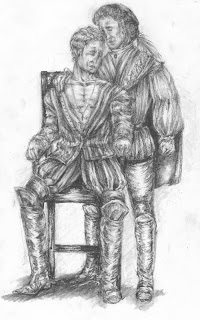 |
| Antonio and Bassanio |
The Merchant of Venice Acts 4 & 5
I wonder if Shakespeare was truly ahead of his time or if he never thought his modern audience would have so much compassion for a character such as Shylock's. In his time, Shylock's ending would have been just and applauded. His conversion to Christianity was welcomed by this 16th century, English society and since he was a Jew, the taking of his fortune was considered a good ending for such a villain. The reason I think Shakespeare might've been beyond his time, is that as a human there is still compassion, and Shylock's character shows himself to be beautifully human and not at all the scum that Christian Venice portrays him as. Whether or not Shakespeare planned it this way, as a modern reader, I cannot stand the humiliation Shylock goes through, and even Portia's (or Balthazar's) punishment for him. Thank goodness the Duke and Antonio showed mercy, or else this would be one Shakespeare's most cruelest plays. The fact that Shylock didn't have to lose his life or half of his estate does show mercy, although the forced conversion is probably, to me, even crueler. To have to be forced to believe a whole new set of beliefs can make one's life meaningless, as I'm sure Shylock might have felt.
As for Antonio and Bassanio's relationship, it is a bit homoerotic. Bassanio would give up many things, even his wife in order to die for Antonio, and Antonio had Bassanio give away his wife's ring in order to please the young lawyer, or Portia. Granted that this new plot gave way to a lighter tone after the cruel court scene, and that Portia and Nerissa showed their superior wittiness to their husbands once again, I can't help but be upset for Portia. She and Nerissa forgive him because they both know they did it for something honorable, but, nonetheless I'm not sure I would want my husband around Antonio (lol). I feel as though, Portia cannot trust her husband seeing as he would so easily be swayed by his friend to part from such a special gift. Bassanio continually enjoys pleasing Antonio, and Antonio seems rather rash to do anything for Bassanio's happiness. Perhaps it is a type of friendship lost in time, lost in the friendships of 16th century men. Or perhaps it is a gender difference, and men would understand this type of behavior more than I would.


